The European tomato market, particularly in major trading hubs like Hamburg, Munich, and Berlin, has displayed a complex landscape driven by diverse sourcing and quality challenges. During the latest market cycle, various types of tomatoes—ranging from cluster to round and beef tomatoes—were supplied primarily from nations like the Netherlands, Belgium, and Morocco, supplemented by Turkish and Spanish imports.
Sourcing Dominance and Distribution
- Cluster Tomatoes (Rispenware): These were largely sourced from the Netherlands and Belgium, with Turkish and domestic German varieties playing a complementary role.
- Round Tomatoes: Supplies were dominated by Morocco and Belgium. However, Turkish imports also maintained a significant presence, although in smaller quantities compared to Moroccan and Belgian sources.
- Cherry Tomatoes: The Dutch and Italian markets served as the main suppliers for cherry tomatoes, consistently providing high-quality produce.
- Beef Tomatoes: Belgium emerged as the key supplier for beef tomatoes, covering nearly all demand, with minimal reliance on other countries.
Spanish tomatoes, generally a major part of the European market, showed limited presence, especially in Hamburg, indicating regional variances in import patterns.
Market Trends and Price Adjustments
Despite the reliance on imports, overall demand was met without significant disruptions. However, quality concerns influenced market activity in specific regions:
- In Hamburg, Moroccan round tomatoes exhibited weakening quality, forcing sellers to offer discounts to ensure sales.
- Both Munich and Berlin faced a downturn in the quality of Turkish cluster tomatoes. As a result, trading for these varieties was suspended mid-week due to decreased consumer interest and market demand.
- Cologne reported generally rising prices, with most varieties seeing increased rates, although Dutch cherry tomatoes experienced slight price reductions.
These price fluctuations and quality disparities reflect the seasonal and logistical challenges inherent in the European tomato trade.
Quality Concerns and Market Reactions
Seasonal shifts often affect the quality of imported tomatoes, especially when long transport routes and storage durations come into play. Moroccan and Turkish shipments, in particular, faced issues in maintaining freshness and appearance, leading to strategic price reductions or the suspension of trade for affected batches. Conversely, robust supply chains from the Netherlands and Belgium ensured better overall product consistency, helping stabilize the market.
The European tomato market continues to demonstrate resilience and adaptability, meeting consumer demand despite the occasional quality and supply hurdles. Strategic sourcing and effective market interventions have played crucial roles in maintaining balance. As the season progresses, stakeholders, from farmers to retailers, will need to remain vigilant about quality control and responsive to market dynamics to ensure a steady flow of high-quality produce.































